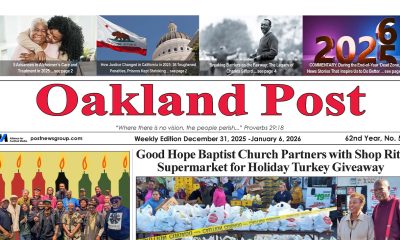Bay Area
Warrant for Raid on Breonna Taylor’s House Connected to Louisville Gentrification Plan, Lawyers Say

Breonna Taylor’s shooting death in Kentucky was the consequence of a Louisville Police Dept. operation intended to clear out a block in western Louisville key to a city plan to gentrify the neighborhood Taylor lived in — lawyers for Taylor’s family allege in an amendment to a lawsuit filed against the city in Taylor’s death.
Taylor was killed in March when police attempted to serve a no-knock warrant to find a man they knew was already in custody. Taylor’s boyfriend, believing they were in danger, fired his gun at the door and police then wantonly shot through a bedroom window. Taylor, an emergency technician, was asleep at the time and was hit by eight bullets.
One of the three officers involved in Taylor’s shooting has been fired, but none have been arrested or charged.
Taylor’s boyfriend, Kenneth Walker III, was charged with assault and attempted murder of a police officer but the charges were dropped.
Lawyers allege that a police unit called Place-Based Investigations “deliberately misled” narcotics investigators to believe they were targeting violent drug offenders at the house where Taylor lived in order to speed up the process for a multimillion dollar real estate development plan in the area.
“The execution of this search warrant robbed Breonna of her life and Tamika Palmer of her daughter,” attorney Benjamin Crump, who is representing Taylor’s family, told a Louisville newspaper over the weekend. “Its execution exhibited outrageous recklessness and willful, wanton, unprecedented and unlawful conduct.”
A representative for the mayor’s office has called the allegation “outrageous.”
According to the lawsuit, the warrants executed in the narcotics investigation on March 13 were intended to eliminate one of the “primary roadblocks” to the development, Jamarcus Glover, who was allegedly involved in narcotics trafficking.
Glover rented a home in the immediate area of the planned development, according to the lawsuit and was an ex-boyfriend of Taylor’s.
To secure the warrant on Taylor’s house, detectives alleged that they had confirmed that Glover was receiving packages there. But that was not true, according to another city agency, the lawsuit says.
That errant connection to Glover is what ultimately led to the raid on Taylor’s apartment, according to the lawsuit.
“Breonna’s home should never have had police there in the first place,” family attorneys say in the lawsuit. “When the layers are peeled back, the origin of Breonna’s home being raided by police starts with a political need to clear out a street for a large real estate development project and finishes with a newly formed, rogue police unit violating all levels of policy, protocol and policing standards… Breonna’s death was the culmination of radical political and police conduct.”
According to the Louisville newspaper the Courier Journal, Louisville PD’s Place-Based Investigations unit was created to address “systemically violent locations.”
“PBI focuses on identifying and disrupting crime place networks,” according to the police department’s website. “These networks include crime sites, but also places used by offenders that do not typically come to the attention of police. PBI will collaborate with other government and community partners to identify and eliminate violence facilitators.”
Meanwhile, “Arrest the Cops Who Killed Breonna Taylor” continues to be a rallying cry on social media and at Black Lives Matter protests.
Activism
OP-ED: AB 1349 Puts Corporate Power Over Community
Since Ticketmaster and Live Nation merged in 2010, ticket prices have jumped more than 150 percent. Activities that once fit a family’s budget now take significant disposable income that most working families simply don’t have. The problem is compounded by a system that has tilted access toward the wealthy and white-collar workers. If you have a fancy credit card, you get “presale access,” and if you work in an office instead of a warehouse, you might be able to wait in an online queue to buy a ticket. Access now means privilege.

By Bishop Joseph Simmons, Senior Pastor, Greater St. Paul Baptist Church, Oakland
As a pastor, I believe in the power that a sense of community can have on improving people’s lives. Live events are one of the few places where people from different backgrounds and ages can share the same space and experience – where construction workers sit next to lawyers at a concert, and teenagers enjoy a basketball game with their grandparents. Yet, over the past decade, I’ve witnessed these experiences – the concerts, games, and cultural events where we gather – become increasingly unaffordable, and it is a shame.
These moments of connection matter as they form part of the fabric that holds communities together. But that fabric is fraying because of Ticketmaster/Live Nation’s unchecked control over access to live events. Unfortunately, AB 1349 would only further entrench their corporate power over our spaces.
Since Ticketmaster and Live Nation merged in 2010, ticket prices have jumped more than 150 percent. Activities that once fit a family’s budget now take significant disposable income that most working families simply don’t have. The problem is compounded by a system that has tilted access toward the wealthy and white-collar workers. If you have a fancy credit card, you get “presale access,” and if you work in an office instead of a warehouse, you might be able to wait in an online queue to buy a ticket. Access now means privilege.
Power over live events is concentrated in a single corporate entity, and this regime operates without transparency or accountability – much like a dictator. Ticketmaster controls 80 percent of first-sale tickets and nearly a third of resale tickets, but they still want more. More power, more control for Ticketmaster means higher prices and less access for consumers. It’s the agenda they are pushing nationally, with the help of former Trump political operatives, who are quietly trying to undo the antitrust lawsuit launched against Ticketmaster/Live Nation under President Biden’s DOJ.
That’s why I’m deeply concerned about AB 1349 in its current form. Rather than reining in Ticketmaster’s power, the bill risks strengthening it, aligning with Trump. AB 1349 gives Ticketmaster the ability to control a consumer’s ticket forever by granting Ticketmaster’s regime new powers in state law to prevent consumers from reselling or giving away their tickets. It also creates new pathways for Ticketmaster to discriminate and retaliate against consumers who choose to shop around for the best service and fees on resale platforms that aren’t yet controlled by Ticketmaster. These provisions are anti-consumer and anti-democratic.
California has an opportunity to stand with consumers, to demand transparency, and to restore genuine competition in this industry. But that requires legislation developed with input from the community and faith leaders, not proposals backed by the very company causing the harm.
Will our laws reflect fairness, inclusion, and accountability? Or will we let corporate interests tighten their grip on spaces that should belong to everyone? I, for one, support the former and encourage the California Legislature to reject AB 1349 outright or amend it to remove any provisions that expand Ticketmaster’s control. I also urge community members to contact their representatives and advocate for accessible, inclusive live events for all Californians. Let’s work together to ensure these gathering spaces remain open and welcoming to everyone, regardless of income or background.
Activism
Oakland Post: Week of December 31, 2025 – January 6, 2026
The printed Weekly Edition of the Oakland Post: Week of – December 31, 2025 – January 6, 2026

To enlarge your view of this issue, use the slider, magnifying glass icon or full page icon in the lower right corner of the browser window.
Activism
Big God Ministry Gives Away Toys in Marin City
Pastor Hall also gave a message of encouragement to the crowd, thanking Jesus for the “best year of their lives.” He asked each of the children what they wanted to be when they grow up.

By Godfrey Lee
Big God Ministries, pastored by David Hall, gave toys to the children in Marin City on Monday, Dec. 15, on the lawn near the corner of Drake Avenue and Donahue Street.
Pastor Hall also gave a message of encouragement to the crowd, thanking Jesus for the “best year of their lives.” He asked each of the children what they wanted to be when they grew up.
Around 75 parents and children were there to receive the presents, which consisted mainly of Gideon Bibles, Cat in the Hat pillows, Barbie dolls, Tonka trucks, and Lego building sets.
A half dozen volunteers from the Big God Ministry, including Donnie Roary, helped to set up the tables for the toy giveaway. The worship music was sung by Ruby Friedman, Keri Carpenter, and Jake Monaghan, who also played the accordion.
Big God Ministries meets on Sundays at 10 a.m. at the Mill Valley Community Center, 180 Camino Alto, Mill Valley, CA Their phone number is (415) 797-2567.
-

 Activism3 weeks ago
Activism3 weeks agoDesmond Gumbs — Visionary Founder, Mentor, and Builder of Opportunity
-

 Activism3 weeks ago
Activism3 weeks agoFamilies Across the U.S. Are Facing an ‘Affordability Crisis,’ Says United Way Bay Area
-

 Alameda County3 weeks ago
Alameda County3 weeks agoOakland Council Expands Citywide Security Cameras Despite Major Opposition
-

 Alameda County3 weeks ago
Alameda County3 weeks agoBling It On: Holiday Lights Brighten Dark Nights All Around the Bay
-

 Activism3 weeks ago
Activism3 weeks agoBlack Arts Movement Business District Named New Cultural District in California
-

 Activism3 weeks ago
Activism3 weeks agoLu Lu’s House is Not Just Toying Around with the Community
-

 Activism4 weeks ago
Activism4 weeks agoOakland Post: Week of December 17 – 23, 2025
-

 Activism2 weeks ago
Activism2 weeks agoFirst 5 Alameda County Distributes Over $8 Million in First Wave of Critical Relief Funds for Historically Underpaid Caregivers















































